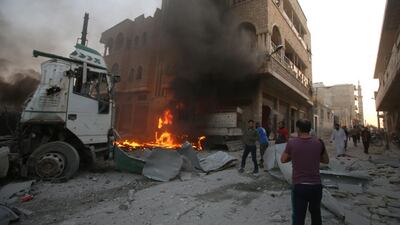The UN on Thursday unveiled a plan that urges the release of women, children and elderly detainees in Syria as a confidence-building measure to kick start moves toward a peace settlement.
Diplomats also said a draft resolution addressing the worsening humanitarian situation in Idlib would reach the Security Council within days.
The proposals come after four months of bombing in Idlib, the north-western rebel-held province that President Bashar Al Assad, backed by Russian air power, wants to reclaim.
Geir Pedersen, the UN's special envoy for Syria, said prisoners held by the government and rebels had to be freed “in a meaningful way and at meaningful scale”, with the International Committee of the Red Cross (ICRC) acting as a neutral intermediary.
More than 100,000 people – mostly at the hands of the government – are estimated to have been disappeared in Syria, either in custody, as the victims of abduction or as missing persons. But only 109 prisoners have been released so far in a series of swaps overseen by the UN and ICRC and coordinated by Turkey and Russia.
“I believe women, children, the sick and the elderly should be released at scale,” Mr Pedersen told the council in New York.
“The government and the opposition must collect, protect and manage information they have on people they hold. The ICRC could play a key role in supporting all sides, including families, with the compilation of information on detained and missing persons.”
Despite the plan, however, the special envoy said that a meeting earlier this week between Russian President Vladimir Putin and Turkish President Recep Tayyip Erdogan had not changed the situation in Idlib.
“The violence is, so far, not abating,” Mr Pedersen said.
In response, Belgium's ambassador to the UN, Marc Pecsteen de Buytswerve, said that along with Kuwait and Germany his country had drafted a resolution designed to address the humanitarian situation in Idlib, where three million civilians live.
The draft resolution is to be circulated among the 15 members of the council but it faces a near certain veto by Russia, which has used its veto power to stop 12 such resolutions during eight years of war in Syria.
Mr de Buytswerve said the Syrian and Russian offensive in Idlib had created a dire combination of “death, displacement and destruction”.
“Many attacks occurred in de-conflicted zones (civilian areas with schools and hospitals that are meant to be spared from bombing), they were well aware of,” the Belgian ambassador said. “We call for the council to take a unified stance.”
Stephen Hickey, Britain's political coordinator at the UN, making his last remarks before leaving his post, said it weighed heavily on him “that despite the best efforts of many of us in this chamber, the international community and this council have failed the people of Syria”.
“But we should be in no doubt that the Assad regime bears the primary responsibility for Syrians' suffering,” he said.
“The regime has bombed them with chemical weapons. It has systematically tortured and murdered the regime’s opponents. And it has targeted civilians through mass indiscriminate aerial bombardment. This is still happening.”

